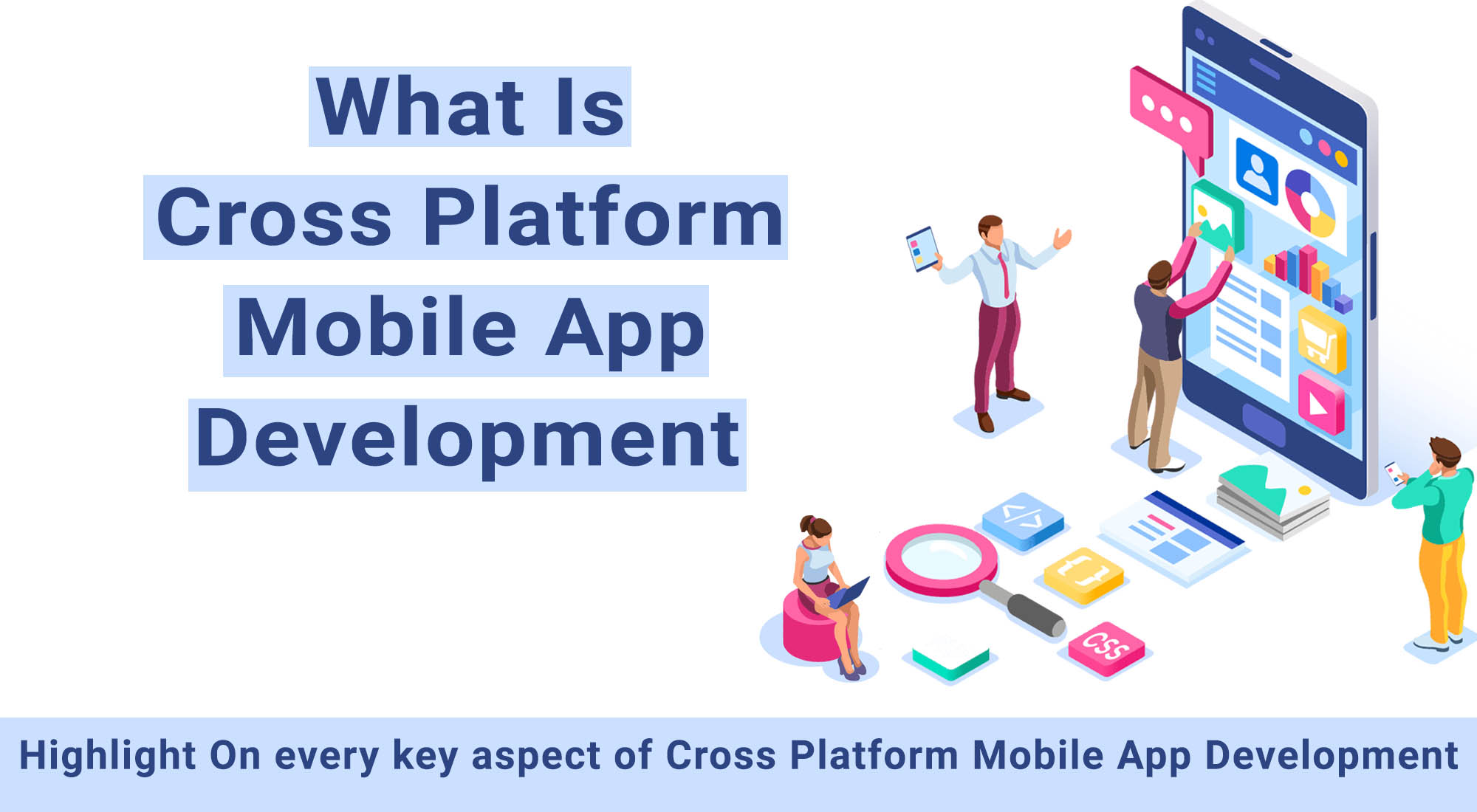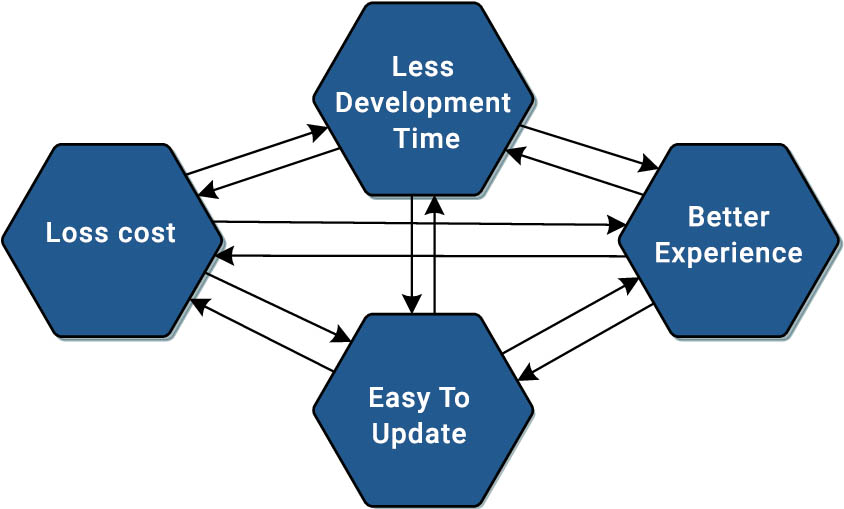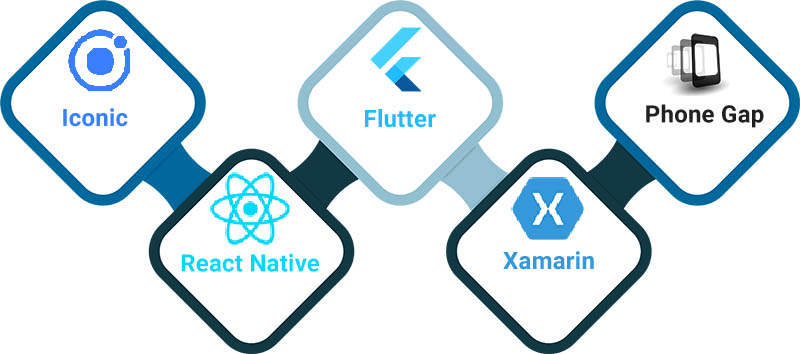What is cross platform mobile app development
Highlight On every key aspect of Cross Platform Mobile App DevelopmentLast updated on 03 Feb 2022 by Dezven

- What is a mobile app and Mobile app statistics
- What is cross-platform mobile app development ?
- Advantage of cross-platform mobile app development
- Disadvantage of cross-platform mobile app development
- Examples of Cross-platform mobile app
- Cost of cross-platform mobile app development
- Cross-platform mobile app Development Framework
- Native vs. cross-platform Mobile App Development
- Career in cross-platform mobile app development
- Conclusion
What is a mobile app and Mobile app statistics
Mobile Apps : A mobile app (additionally known as an app) is a kind of software designed to run on a cell tool, which can be a smartphone or tablet laptop. Even if apps are generally small software program gadgets with restrained characteristics, they still control to provide customers with great offerings and reports. Every mobile app presents an isolated and limited functionality. For instance, it could be a game, a calculator, or a cellular web browser.
Mobile app statistics : There is an increase in downloads, mobile customers, and mobile gadgets globally is projected to notable boom in 2022, it’s clear how indispensable mobility is to our society.
- By 2025, there can be a projected 7.49 billion mobile customers around the globe.
- In 2021 there were 230 billion app downloads.
- In 2021 app shop spend to hit $170 billion worldwide, and growth of 30% over a year.
- Globally, the common mobile user spent 48 hours on their cellular tool in 2021.
- Seven of every 10 mins on a mobile device is spent on social media and photograph & video apps in 2021.
- Total hours spent watching video streaming apps grew 32% worldwide considering the pre-pandemic stages.
- Americans spent 27.7% greater time on cell phones than watching stay TV every day.
- 53% of internet traffic comes from cellular phones.
- 92.5% of time spent on a mobile cell phone is spent on the usage of mobile apps.
What is cross-platform mobile app development ?
Cross-platform programs combine the best of worlds: those are actual apps you install on your smartphone, and in maximum instances, users can’t tell they aren’t using a native app. At the same time, there’s no need to lease separate improvement groups due to the fact iOS and Android apps are built with precisely the equal toolset: one among several JavaScript frameworks or Google’s new Flutter.

In more simple words, the cross-platform development challenge aims to create mobile apps well-matched with several running systems. Cross-platform apps run on iOS, Android, and Windows. Cross-platform apps look and experience like apps developed particularly for the running system. Developers write code once and set it up in each operating system. Developers use several different programming languages to create cross-platform applications. Their toolkit consists of HTML, CSS, Java, and JavaScript.
Advantage of cross-platform mobile app development
Under this section, we will see the advantages of cross-platform that a developer and users experience.

Loss cost – The cost of development of the cross-platform is very less.
Better experience - Cross-platform apps have interfaces similar to native apps, offering a consistent and amazing user experience.
Less Development time – Cross-platform apps require very less time and energy for their development.
Cross-platform apps are very easy to test and maintain.
Disadvantage of cross-platform mobile app development
With so many advantages, a Cross-platform app has some disadvantages too. Which are they? Let’s read.
Limited functionalities - Certain platform-unique capabilities can be accessed efficiently with only native code. you won’t be able to get augmented reality in a cross-platform app.
Cross-platform app development requires a skilled trainer.
Examples of Cross-platform mobile app
There are so many mobile apps that are built using cross-platform. Let’s explore a few of them.
1) Firefox : There is no doubt that one of the most popular cross-platform apps in Firefox. No other browser has come as close as Firefox Internet Explorer. A true cross-platform browser has become essential when you consider that so many working and offerings are now dealt with online. Thankfully, the upward push in the reputation of cross-platform browsers like Firefox has helped make certain that organizations don’t lock down their websites and offerings to a single browser.
2) Adobe Reader :There’s no scarcity of PDF readers available. And for every platform, there may be a unique PDF reader. But none of these unique visitors gives the nice and simplicity of use that Adobe Reader presents. It is the standard for PDFs, and with clients for pretty much each platform, it’s a clear winner over the opposition.
3) Chrome :Never before has a Web browser created this type of buzz. Google Chrome is speedy (the Linux model has been examined because the fastest rendering Web browser on any platform), it's far strong, extensible, and as cross-platform as any other browser (no longer known as IE).
4) VLC :You will be under-stressed to find a more bendy and useful media participant than VLC. VLC is for Linux, Mac, Windows, UNIX, Solaris, and more. It can play nearly the whole thing or even do it across a network. It has a tiny footprint, it’s open-source, and it’s loose. What greater do you want in a media participant?
Cost of cross-platform mobile app development
How tons does it cost to develop a cross-platform app? Cross-platform mobile app development may cost you from $20,000 to $60,000, relying on the app capability, alongside the platform wherein you need to launch your product.
Furthermore, the Cost of Mobile App Designing may vary based totally on the country and company involved. You can also decide on the currency price of a leading element in this context. To enjoy the first-rate price of app layout and improvement you need to contact an app development business enterprise.
Cross-platform mobile app Development Framework

1) Flutter
Google created Flutter as a cross-platform framework. Flutter has many remarkable capabilities. Some of those include seamless animation, SDK (Software Development Kit), and a great UI. Flutter supports native device features like camera, location services, and hard drive access too Flutter makes use of the Dart programming language.
Pros of Flutter
- It assists 2-D app
- Has Robust innovative designs
- Supports stock platform app improvement.
Cons of Flutter
- Apps tend to be heavy
- Dart is not a completely famous programming language
- It’s a new device without a big user base.
Developer’s tool of Flutter
Emacs, Android Studio, and VS Code are the tools used by the developer to create it. Android studio has responsive and creative features.
Offical Website of Flutter
2) React Native
Facebook launched React Native in 2015. React Native allows builders to create hybrid native/cross-platform apps. Developer’s love React Native for its velocity and lightness. React creates apps that paintings on Android, IOS, and UWP.
Pros of React Native
- It possesses Instant previews that permit instant development.
- Hot Reloading, much faster than in native app development
- Allows code sharing across platforms
- Focuses on UI
- Allows apps to apply native features
Cons of React Native
- Not completely a cross-platform, alternatively React Native is a hybrid solution.
- No constant launch schedules.
- Takes longer to debug, especially for Android gadgets.
Developer’s tool of React Native
Emulator, SDK, Android Studio, JS Editor, and Xcode are the majorly used developer tools for React Native.
Offical Website of React Native
3) Node.js
Node.js creates hybrid apps that use HTML 5, CSS, C#, C++, and JavaScript. Node.js has a strong back end. Node.js offers developers safety and versatility.
Pros of Node.js
- Open-source
- Secure
- Flexible
- Supports Native characteristics
Cons of Node.js
- Not wonderful for hardware-extensive apps
- Coding for iOS ought to be done on a Macintosh
- Old plugins
Developer’s tools of Node.js
The tools used to achieve the Node.js are Node.js desktop developer and Node.js app developer.
Offical Website of Node.js
4) Xamarin
Xamarin works throughout on cross-platforms with C# and .NET languages. Xamarin commenced as an open-source. Xamarin aimed to be a remedy to complicated native app improvement processes.
Pros of Xamarin
- Uses C#, so it integrates well with Visual Studio
- Strong user base of 60,000 contributors
- Allows code sharing throughout systems at a charge of 75%
- Single tech stack that each builder and firms love
Cons of Xamarin
- Not extraordinary for pics-heavy app improvement
- Limited libraries
- Expensive for organization users, however, unfastened for people and start-ups.
Developer tool of Xamarin
Visual studio and Xamarin Studio are used as a tool for the development of Xamarin.
Offical Website of Xamarin
https://dotnet.microsoft.com/en-us/apps/xamarin
5) Iconic
Developers like Ionic for hybrid app improvement. Ionic is open-source, scalable, and easy to study. Ionic incorporates a high-quality set of gear. Ionic’s device set includes aid for material design, native-like UI additives. Ionic releases update regularly. Ionic apps have many native-style functions.
Pros of Ionic
- Developer-centred
- Tools have native app features
- A large community uses Ionic
Cons of Ionic
- Unstable plugins
- Debugging is a task because of uncertain mistakes
Developer’s Tool of Iconic
Iconic App flow, visual studio & Firebase are the tool used for developing Iconic.
Offical Website of Iconic
Native vs. cross-platform Mobile App Development
| # | Native app | Cross app development |
|---|---|---|
| Codes | For only one platform | For multiple platforms |
| Access to device capabilities | Full | Limited |
| Performance | Seamless | High, but sometimes lag |
| Development cost | High | Relatively low |
| Development Time | Average | Comparatively very less |
Career in cross-platform mobile app development
1) Jobs in cross-platform Mobile App development.
As per todays, mobile industry scenario is concerned, there is tremendous growth in IT sectors. The mobile has become the basic need of every human across the globe. Also, cross-platform mobile apps are very great in terms of features, functions and offer a relaxing experience to users. Moreover, its development cost and time are less, which makes it a choice of developer and company. All these factors collectively keep it in the growing market race of the mobile app industry which end up in more jobs availability.
2) Future of cross-platform mobile app development.
As discussed in this article, cross-platform app development is one of the first choices of many developers. And the speed with which the mobile industry is growing and attracting users, there won’t be any scarcity in future jobs, undoubtedly.
Conclusion
Cross-platform mobile app development is a complete package of the requirement of the developers and the needs of the users. It is giving all the features and functions that users can demand and ease in development to the developer and the producing enterprise.

- What is the difference between Hybrid Apps and Native Apps
- What is hybrid mobile app development
- What is native mobile app development
- What is mobile app development
- What are the different types of mobile app development
- What is Web based mobile app development
- What technology framework is used to build hybrid mobile apps
- Which Programming Language is used for Android Application Development
- Best Programming Language For Mobile App Development